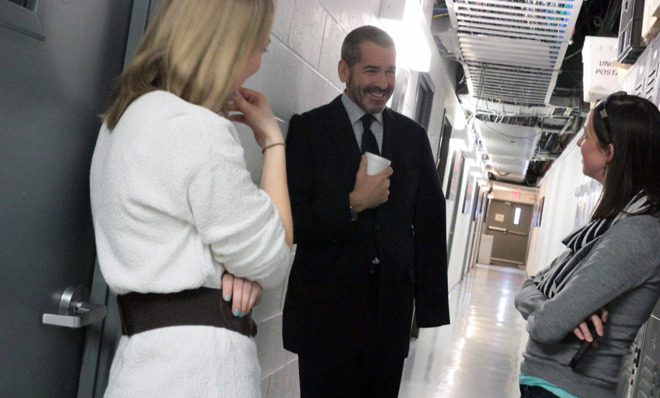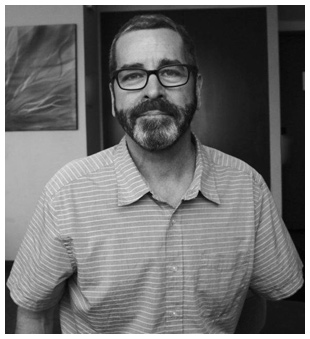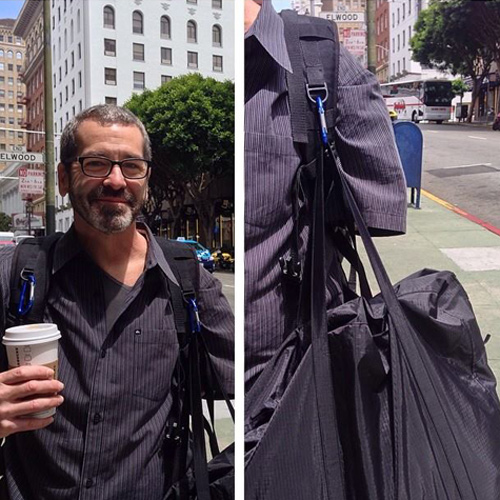My new life with one arm
Losing a limb has been a learning experience. Lesson No. 1: All is not lost.

A free daily email with the biggest news stories of the day – and the best features from TheWeek.com
You are now subscribed
Your newsletter sign-up was successful
DENIAL IS POWERFUL. It can be a crucial coping tool when experiencing loss or trauma, but it also can unmoor you from reality. From the time I lost most of my left arm in February, I was living in that parallel universe, one where I'd power through, barely acknowledging the amputation — until I went for a run on the sunny afternoon of April 6.
It was nothing more than a slightly uneven sidewalk that took me down. No problem for a runner with two arms. In fact, this particular sidewalk is right behind my home, and I had negotiated it uneventfully for years. But here are two things you need to know about life after an arm amputation: First, your center of gravity changes dramatically when you are suddenly 8 pounds lighter on one side of your body. Second, while my arm may be missing physically, it is there, just as it always has been, in my mind's eye. I can feel every digit. I can even feel the watch that was always strapped to my left wrist. When I tripped, I reached reflexively to break my very real fall with my completely imaginary left hand. My fall was instead broken by my nose, and my nose was broken by my fall.
Lying on that sidewalk, moaning in pain, I reached the end of Denial River and flowed into the Sea of Doubt. It finally dawned on me in that instant that I was, indeed, handicapped. That may not be the term of choice these days — "differently abled" or "physically challenged" may be de rigueur — but as I touched my bloody face, feeling embedded chips of concrete in the wounds, "handicapped" sure seemed to fit.
The Week
Escape your echo chamber. Get the facts behind the news, plus analysis from multiple perspectives.

Sign up for The Week's Free Newsletters
From our morning news briefing to a weekly Good News Newsletter, get the best of The Week delivered directly to your inbox.
From our morning news briefing to a weekly Good News Newsletter, get the best of The Week delivered directly to your inbox.
Truth be told, my arm never did feel "gone." The whole thing is such a fluke I have a hard time making sense of it. Frankly, I'm not interested in revisiting the excruciating details (more denial!). But the sound-bite version is this: I was on a reporting trip in the Far East, first to Japan for a story about the Fukushima reactor and then to the Philippines for one about genetically modified rice. As I was packing up my TV gear, a heavy case of equipment fell on my left forearm. What began as a fairly bad bruise evolved into something life-threatening: acute compartment syndrome, which blocks blood flow. When I got to a doctor in Manila, he recognized the problem and sent me in for emergency surgery. He tried to save the arm, but it was too late. It was a life-or-limb decision. But when the anesthesia receded and I rejoined the world of the living, I was convinced that the doctor had saved it. It was a good thing drugs were still coursing through my veins when I took my first look. No hand. No forearm. No elbow. All of it gone.

I HAD BEEN traveling alone, hiring local drivers and fixers. As an independent TV producer, I have always been a do-it-yourself kind of guy. This might help explain why I didn't let anyone know what had happened to me for more than a week. Maybe I could just heal a little, then sneak back home. You know, denial. So instead of calling in the cavalry, I enmeshed myself in work. My Fukushima stories needed to be ready in time for the anniversary of the meltdowns. But there was also a practical problem: As a freelancer, I eat what I kill. I had spent a lot of money on travel, and on hiring local help. I had to deliver the completed work or take a huge loss. So I wrote my scripts, and when friends and family checked in, I acted as if all was well.
When I got back about a week later, I told my kids in a Skype conference call. My 21-year-old son is studying in Beijing. My daughter, 19, is at college in North Carolina. I dreaded breaking the news to them, but they expressed love, support, and gratitude that I was alive. It brought tears to my eyes — mostly because I was just so proud of them.
My other big worry had to do with my livelihood. I am in a business where looks matter, and I wasn't aware of any one-armed TV correspondents. Would my empty sleeve end my on-camera career? At the PBS NewsHour, they were just as accepting and supportive as my own children. When I asked if I should shoot and edit around my disability, my boss told me, "No one cares. Just be your smart, engaging self." Then came a call from the old girlfriend who had ditched me: CNN. It was a bitter breakup, but I had moved on. Now she was obsessed with the missing Malaysian airliner, and I am a pilot and aviation geek. They wanted me on the air as fast as possible. It would've been sweet enough even if I still had two hands. But for a newly minted amputee unsure of my future, it was the best medicine imaginable.
A free daily email with the biggest news stories of the day – and the best features from TheWeek.com
I'D ALWAYS HEARD amputees talk about the stares and the acute awareness of being viewed as different. During my first shoot for the NewsHour with one arm, I was wearing a blazer when I met a researcher I was to interview. She left the lab, and I took my jacket off. When she returned, it was a good thing she wasn't sipping her coffee, because she would have offered up an amazing spit take. It didn't really bother me — perhaps because of the honesty of her reaction. What makes me more uncomfortable is when I notice people consciously looking away. Is that pity? Revulsion? On the sidewalks, I look straight at people looking at me, and lots of times, they smile. Maybe I am still attractive. Or maybe I'm a freak.
The mono-mano life is more manageable than you might think. If you were to tie one hand behind your back and go through your day, you could accomplish just about everything. It takes longer, but it can be done. There are some things that make one-handed life easier. I use a cutting board that sits on suction cups and has a lip and some spikes that can hold a slice of bread or a piece of fruit in place. I have a one-armed bottle opener, a fork with a knife-like edge called a "knork," a hook that allows me to button and unbutton my one cuff, and, of course, an electric can opener.
I'm also learning to use a prosthetic arm. It's body-powered, meaning I wear a harness and manipulate the artificial elbow and hand by moving my stump forward. The basic technology dates back to the 16th century. By comparison, the split hook that is my new hand is a modern marvel, patented in 1912. Despite the remarkable advances in prosthetic technology in recent years, now that I am a potential customer, I see shortcomings. The devices rely on actuators, which in turn rely on batteries. That makes these arms very heavy, less reliable, and not weatherproof. Replicating what the human hand does is a very difficult problem for engineers. I have learned, though, that one hand — with all its dexterity, sensitivity, and opposable-thumb efficiency, alongside something that has the simple ability to grasp — is all you need.

Problem: one suitcase, one latte and one arm. Solution: carabiner on backpack.
THE BIGGEST PROBLEM I cope with is phantom pain. My arm has become a ghost, immobilized as if it were in a sling — which is where it was the last time I saw it. The arm feels as if it's been asleep and the circulation has just begun once again. First thing in the morning, it's actually a pleasant, painless feeling. My arm is suspended, almost as if it is weightless. But as the day goes on, it feels as if it is progressively bound tighter and tighter, to the point of excruciating pain. In addition, my fingers often feel as if they've been jolted with surges of electricity.
Doctors don't really know how to treat pain in a part of the body that no longer exists. I'm taking a fairly heavy dose of Neurontin, which is also used to treat epilepsy, restless-leg syndrome, and insomnia. I'm not supposed to stop taking it abruptly, so there's no way for me to test exactly how well it's working. Acupuncture, massage, and exercise help. So does marijuana. I've also tried mirror therapy, where I place a mirror on a table perpendicular to my chest and sit up close, so it looks as if I have my missing left hand back. If I concentrate on moving my phantom left hand and matching its movements with my right hand, my brain is tricked into thinking that its old internal map is still complete. The movements alleviate a lot of my phantom pain.
How this works is mysterious. Recent research suggests that our brains map out our bodies, like a neural schematic of switches, channels, and routers in a complex communications network. When there are suddenly no circuits feeding areas of the brain that control a newly missing limb, the nerves in another part of the body will attempt to fill in the gaps. So now when I scratch my cheek, or the bottom of my heel, or my chest near the sternum, I feel a sensation in the fingers of my missing hand. Odder still, when I take a drink of something cold or hot, it feels as if it is flowing directly into my phantom arm. I also get a tingling feeling there when I'm having sex.
BESIDES THE PAIN, the biggest inconvenience about being one-armed isn't any individual task, but in the aggregate. I had a very busy, overbooked life before I lost my arm. Now each thing I do takes longer — sometimes much longer. I could tell you about toasting a bagel, opening a new box of cereal, or changing the trash bag, but you get the idea. A morning routine that used to take 30 minutes now lasts more than an hour. At the end of each day, I have always done less than I expected to do. This makes me cranky. I have, grudgingly, learned that it is not always good to try to do everything yourself. And I am asking for help much more than I ever did before. Guess what? People want to help. Especially other amputees, who have been generous with ideas and experiences.
Two months to the day after my accident, I went to see a therapist for the first time in my life. I didn't know where to begin. We discussed loss and resilience and the will to live and adapt. But when I started talking about the outpouring of love and support that I had received since my accident, I began weeping uncontrollably. I realized that for the first time in my life, I was truly letting love into my heart. Losing an arm has connected me to others in a way I have never felt. Yes, I have suffered a tremendous loss, but in a way, I feel as if I have gained much more.
Excerpted from an article that originally appeared in the June 9–15, 2014, issue of New York magazine. Reprinted with permission.
(Embedded photos courtesy Facebook.com/The Official Miles O'Brien Page)
-
 My Father’s Shadow: a ‘magically nimble’ film
My Father’s Shadow: a ‘magically nimble’ filmThe Week Recommends Akinola Davies Jr’s touching and ‘tender’ tale of two brothers in 1990s Nigeria
-
 Send Help: Sam Raimi’s ‘compelling’ plane-crash survival thriller
Send Help: Sam Raimi’s ‘compelling’ plane-crash survival thrillerThe Week Recommends Rachel McAdams stars as an office worker who gets stranded on a desert island with her boss
-
 ‘Longevity fixation syndrome’: the allure of eternal youth
‘Longevity fixation syndrome’: the allure of eternal youthIn The Spotlight Obsession with beating biological clock identified as damaging new addiction